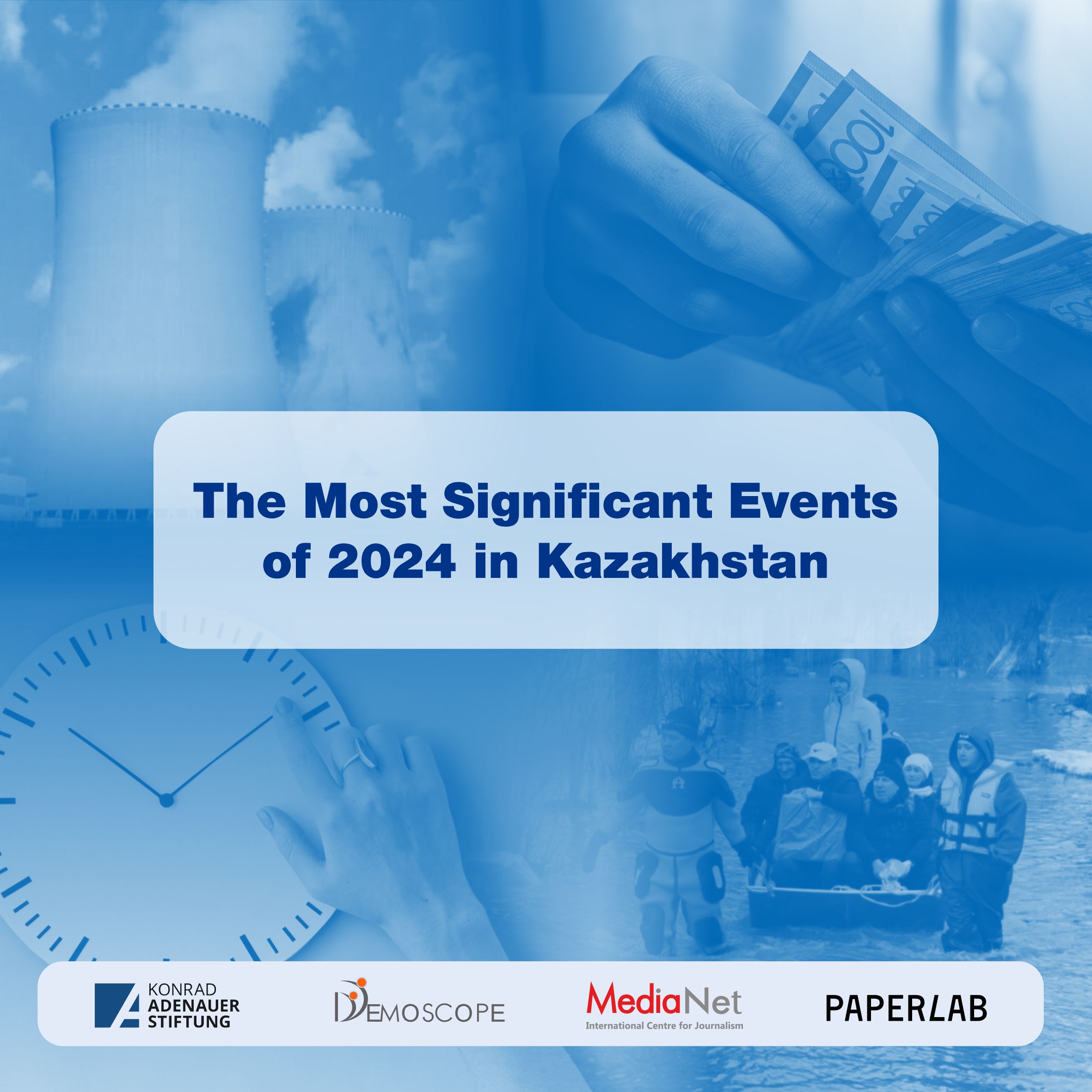
The highest dissatisfaction levels were recorded among residents of eastern and central regions, as well as in major cities such as Almaty and Astana.
From November 27 to December 11, 2024 DEMOSCOPE Public Opinion Express Monitoring Bureau conducted a survey on the topic of The Most Significant Events of 2024 in Kazakhstan. The project is implemented by MediaNet International Center for Journalism in collaboration with the PAPERLAB Research Center and supported by Konrad Adenauer Foundation.
The final DEMOSCOPE survey traditionally focuses on the most resonant events of the year. This year’s key themes included citizens’ perception of the transition to a single time zone and their assessment of socially significant areas of life.
On March 1, 2024, Kazakhstan switched to a single time zone. However, discussions about this decision persist. According to DEMOSCOPE’s survey, the majority of citizens (53.1%) do not support the change, 22.1% approve, 15.5% are indifferent, and 7.4% have not heard about it.
A critical factor influencing attitudes toward the reform is the respondent’s region of residence. Notably, the majority of citizens in nearly all regions of Kazakhstan expressed opposition to the decision, with dissatisfaction particularly pronounced in regions where the clocks were set back by one hour.
An overwhelming majority of residents in the eastern and central regions (74.6%)—including Abay, East Kazakhstan, Zhetysu, Karaganda, and Ulytau regions—voiced opposition to the unified time zone. Significant opposition was also recorded in Almaty (68.4%) and Astana (55.7%).
In the southern regions (Shymkent, Almaty, Zhambyl, Kyzylorda, and Turkestan), 47.8% of respondents expressed dissatisfaction with the initiative, while in the northern regions (Akmola, Kostanay, Pavlodar, and North Kazakhstan), the figure stood at 45.3%.
The only region where supporters of the single time zone slightly outnumbered opponents was Western Kazakhstan (Aktobe, Atyrau, West Kazakhstan, and Mangystau regions), with 31.8% in favor and 30.6% against.
To identify the most resonant events of 2024, DEMOSCOPE survey participants were asked to name two or three events they considered the most significant. These included:
- Flooding (10.8%)
- Referendum on building a nuclear power plant (10.4%)
- The murder of Sherzat Bolat in Talgar (7.8%)
Other notable events included:
- Transition to a single time zone (7.6%)
- Earthquakes (6.4%)
- Bishimbayev’s conviction for the murder of Saltanat Nukenova and amendments to the domestic violence law (4.4%)
- Tenge devaluation (3.1%)
- Kazakh athletes’ performances at the Paris Olympics (2.6%)
- International events and state visits (2.3%)
- World Nomad Games in Astana (2%).
Another key indicator of the year was the issues that concerned citizens the most. According to DEMOSCOPE, Kazakh citizens were primarily worried about low income and wages (37.6%), rising prices for essential goods (28.3%), and corruption (26.8%). The issues of low income and corruption were also identified in previous surveys as key factors driving brain drain and hindering the development of domestic sports.
Additional pressing social problems included:
- Low pensions, allowances, and scholarships (20.6%)
- Environmental pollution (19.3%)
- Unsatisfactory education system (16.2%)
- Inadequate healthcare system (16.1%)
- Lack of or poor-quality housing (13.1%)
- Unemployment and difficulties finding jobs (12.7%)
- Poor transport infrastructure (9.3%).
The DEMOSCOPE survey also recorded dissatisfaction with the state of key life domains. Citizens were most critical of the environment (54%), the economy (46.5%), and living standards (43.3%).
Negative assessments were also noted in areas such as employment (32.9%), healthcare (31.4%), law and order (26.6%), education (26.3%), and political and civil liberties (20%).
The deterioration in public evaluation becomes more apparent when comparing DEMOSCOPE survey results over two years. In December 2023, citizens also assessed key life areas, and the 2024 data shows an average decline of 8% in all directions.
The most significant negative trend was in the economic situation, with 33.4% noting deterioration in 2023, rising to 46.5% in 2024.
Interestingly, despite worsening living conditions, the majority of citizens (58%) remain optimistic, believing that 2025 will be better than the current year. Meanwhile, 14% expect 2025 to be similar, 6.3% anticipate it will be more difficult, and 21.7% are unsure.
DEMOSCOPE’s findings reflect a high level of social dissatisfaction, exacerbated by the majority’s disapproval of government decisions. These factors could contribute to increased protest sentiment and social instability in the future.
Note: Respondents could select multiple answers for certain questions. Detailed survey results are available on the project website.
Press releases and infographics in Kazakh and Russian are available via the link.
When using the material, a hyperlink to the DEMOSCOPE website is required.
Methodology:
From November 27 to December 11, 2024, 1,100 people were surveyed across 17 regions and cities of national significance (Astana, Almaty, Shymkent). The survey was conducted through telephone interviews with mobile subscribers in Kazakhstan. The sampling base was generated using a random number generator. The phone interviews were conducted by the KT CloudLab Contact Center.
Participants included 47.5% men and 52.5% women aged 18 and older. Of these, 43.1% preferred to respond in Kazakh and 56.9% in Russian. The ethnic composition was 70.4% Kazakhs, 14% Russians, and 14.9% other nationalities. A total of 66.7% of respondents were urban residents, while 33.3% lived in rural areas.
Data were weighted by gender and age parameters. The maximum margin of error with a 95% confidence level does not exceed 3%. The response rate was 9.6%.
The survey was conducted by MediaNet International Center for Journalism Public Foundation with the support of Konrad Adenauer Foundation. The survey results reflect respondents’ views.
For additional information, please contact coordinator Snezhana Tsoy: snezhana.tsoy@medianet.ngo
